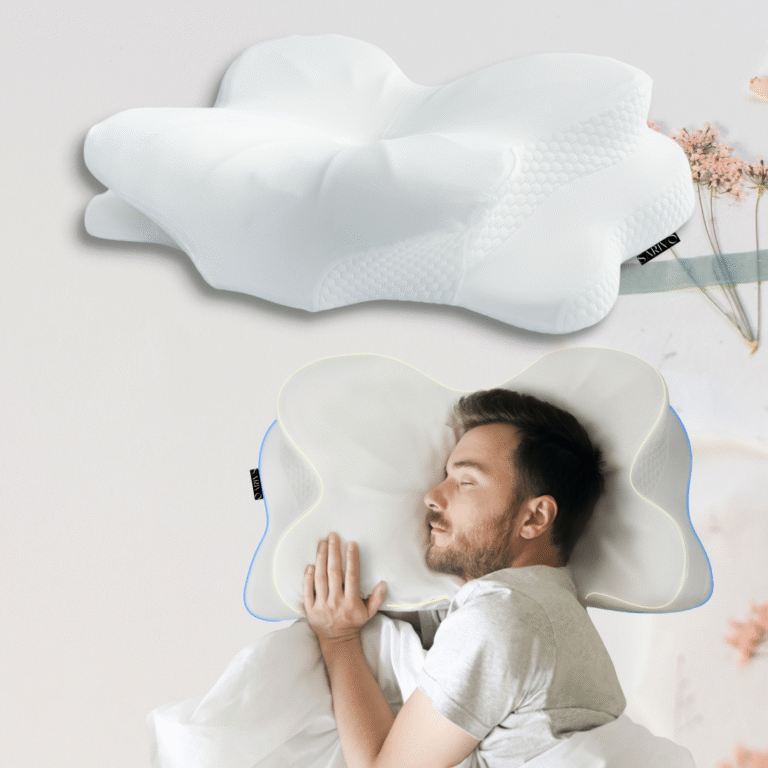
Do you wake up with stiffness, soreness, or an aching neck, shoulders, and back? You’re not alone. Millions of people struggle with daily musculoskeletal pain without realizing that the root cause often starts at night—how you sleep.
Restless sleep isn’t just tossing and turning—it’s a sign that your body isn’t aligned or supported properly. Over time, poor sleep posture disrupts spinal health, reduces recovery, and creates a painful cycle of stress, fatigue, and discomfort.
As an orthopedic perspective shows, ignoring these small signals can lead to long-term posture problems, nerve compression, and even mental health struggles. Let’s dive into what restless sleep really does to your body—and how neck, shoulder, and back pain impact your health more deeply than you think.
Your spine is designed to stay in a neutral alignment while you sleep. But when you curl awkwardly, twist your neck, or sleep on unsupportive pillows, the spine loses its natural curve.

👉 This uneven stress causes:
Micro-strains on muscles and ligaments
Disc pressure and inflammation
Morning stiffness and limited mobility
Over weeks and months, these small misalignments create chronic pain that lingers into your day.


Sleep is meant for recovery—but restless nights force your muscles to “work” instead of rest.
Neck muscles tighten when your head isn’t supported.
Shoulder muscles strain when compressed under body weight.
Back muscles stiffen from constant micro-adjustments.
The result? You wake up with muscles that feel sore, heavy, and fatigued before the day even begins.

Shifting all night increases pressure on nerves and joints. This can cause:
Numbness or tingling in arms and legs
Pins-and-needles sensations
Reduced blood circulation
Poor circulation at night directly worsens muscular fatigue and contributes to daytime energy loss.
Deep sleep is when the body repairs tissues, muscles, and discs. But constant restlessness interrupts this stage, leaving your body half-recovered.

👉 Over time, this creates:
Cumulative strain on your neck and back
Lower resistance to stress and injury
Higher risk of long-term posture issues
Sleeping poorly every night doesn’t just cause temporary discomfort—it reshapes your posture. Common issues include:

Forward head posture (tech-neck)
Rounded shoulders
Lumbar slouch
These changes increase spinal load during the day, causing pain that worsens with age.

Many dismiss these aches as “normal,” but chronic pain in the spine and surrounding muscles affects nearly every system in your body.
Stiff neck reduces rotation and flexibility.
Shoulder pain restricts arm movement, making lifting and daily tasks harder.
Muscle imbalance alters walking, sitting, and even breathing patterns.
When poor posture or disc issues compress nerves, symptoms spread:
Numbness and tingling in arms and legs
Shooting pain (sciatica)
Weakened muscles and reduced coordination
Tension in the neck and upper back often triggers tension headaches or migraines.
Pain interferes with deep sleep cycles, leaving you restless, unfocused, and fatigued.
Living with daily pain drains emotional energy. Research shows chronic musculoskeletal pain is strongly linked to:
Anxiety
Depression
Irritability
Pain is not just physical—it affects your mental resilience and happiness.
Accelerated wear-and-tear → degenerative disc disease or arthritis
Permanent posture changes → rounded back or spinal hunch
Reduced independence and mobility in later years
Final Word: Listen to Your Body Before It’s Too Late
Neck, shoulder, and back pain are not “just normal.” They are warning signs that your spine, muscles, and posture are under stress. Restless sleep magnifies the damage, preventing your body from healing overnight.
👉 The good news: You can break the cycle.
Improve your sleep posture
Use ergonomic pillows for spinal alignment
Practice daily stretches
Seek professional care if pain persists
Your body is constantly sending signals—listen before small aches become lifelong struggles.
Support Email:
admin@sarivo.co
Copyright © 2025 Sarivo LLC. All rights reserved.